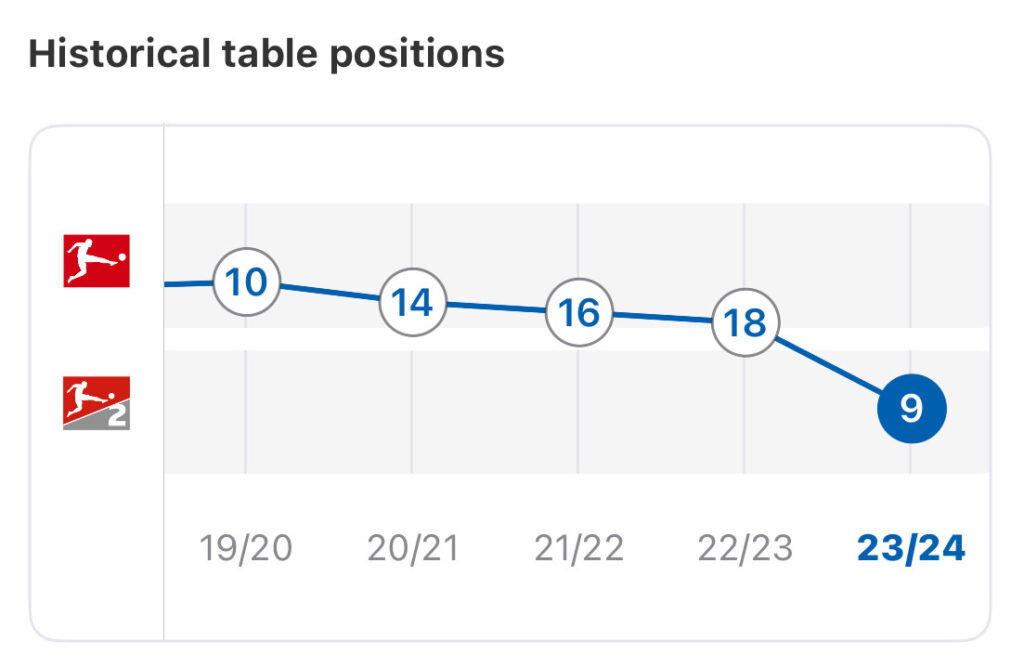Olympiastadion Berlin: The second tier stadium that will host the final of Euro 2024
Next month, the Olympiastadion in Berlin will assume one somewhat unwanted crown when it becomes the first second division stadium to host a World Cup or European Championships final. The relegation of Hertha Berlin this time last year was greeted in the German and indeed, English media, as sombre news. The club were another of those that had been purchased by 777 partners, who’d also sunk a lot of money into Everton with a view to adding to their multi-club portfolio.
By Ian King
A year on, the 777-Everton deal belongs to the history books. Their attempt to buy into the Premier League is in tatters but, following a season of points deductions, Everton did at least finish last season safe. The club remains up for sale, but there is interest and the panic stations that have been sounded on their behalf feel more distant than they did. Talk of any need for a ‘fire sale’ in the media is likely misdirection.
But what of Hertha? How did they react to relegation to the 2. Bundesliga? The big concern about their relegation last year wasn’t so much that they were being relegated. This had previously happened in 1991, 1997, 2010, and 2012. The concern was the condition that the club was in on this occasion, as they fell through the trapdoor.

Already burdened with heavy debts from years of mismanagement by former backer Lars Windhorst ($406m was thrown down that particular sinkhole), the 777 deal had been agreed in March 2023 with desperation hanging heavy in the air. Now they’re not even on the scene any more, even though they still own a 64.7% stake in the club, although Germany’s 50+1 rule means that the voting rights remain with the supporters, which offers a form of protection to the club itself.
There are essentially two answers to the question of how Hertha coped with their relegation. From one perspective, the answer is ‘pretty well’, but that perspective is really limited to fans keeping the faith with the club. Their average home attendance of almost 51,000 was bettered only by two other fallen giants of German club football, Schalke 04 and Hamburger SV. They have done their bit, of that there can be little question.
This wasn’t, however, reflected on the pitch. Hertha finished their first season back in the 2. Bundesliga ninth in the table. In some senses, they could have been worse. After five games, they’d won one and lost four, the most recent of which had been a 6-4 defeat at Magdeburg which left them one place off the bottom of the table. An improvement in form steered them clear of the embarrassment of a second successive relegation, while they also reached the quarter-finals of the DFB-Pokal before losing at home to eventual finalists Kaiserslautern.
Windhorst’s spell running the club had been a car crash, spectacularly falling out with initial managerial appointment Jürgen Klinsmann and later hiring an Israeli detective agency in an attempt to unseat the club’s then-president, Werner Gegenbauer. Neither had especially covered themselves in glory during their attempts to manage the club over this period. Windhorst’s spending was atrocious and his attempts to brand Hertha as a ‘big city club’ fell flat on their face.
But this was also a season of tragedy within the club following the sudden and unexpected death of club president Kai Bernstein at the age of 43 in the middle of January. Bernstein was a former hardcore ultra who’d been surprisingly elected into his position in June 2022, and he was widely regarded as a symbol for a fan-centric future at a club which had previously been so badly mismanaged by corporate interests. To say that his passing was a shock would be something of an understatement.
When the Olympiastadion hosted the 2006 World Cup final, Hertha Berlin had just finished in 6th place in the Bundesliga. This time, they’ll have just finished over a division lower. The contrast with the past is striking. The 2006 World Cup was close to the middle of the high point in the recent history of this club. Between 1999 and 2009 they finished below halfway in the top flight just once, finished third once, fourth three times and fifth twice. But this period ended in chaos, with relegation in 2010.
The 2. Bundesliga is littered with the zombified bodies of the fallen. As well as Hertha Berlin and the aforementioned Hamburg and Schalke, there are plenty of other clubs that have fallen from grace playing at this level; Fortuna Düsseldorf, Hannover 96, Kaiserslautern and Nürnberg among them. There are no guarantees that getting back is going to be easy. It certainly wasn’t, the last time around.
But Hertha have at least financially stabilised. The club is understood to have cut costs significantly, while they’ve even had plans for a new stadium of their own for a couple of years, though this is some way off happening. Last season saw the promotion of a number of academy players, so there’s room for optimism.
They will be sold, as 777’s former empire starts to shift its shape under the weight of its own contradictions. But have Everton dodged a bullet? Well, there can always be worse new owners, but there’s little to suggest that they haven’t. And while Everton may have dodged one, Hertha Berlin’s problems were greater and started before they arrived.
(Images from IMAGO)
You can follow every game in Euro 2024 with FotMob — featuring deep stats coverage, xG, and player ratings. Download the free app here.